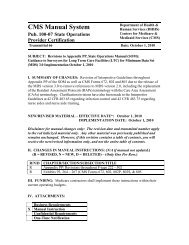LOUISIANA Community Mental Health Services Block Grant ...
LOUISIANA Community Mental Health Services Block Grant ...
LOUISIANA Community Mental Health Services Block Grant ...
You also want an ePaper? Increase the reach of your titles
YUMPU automatically turns print PDFs into web optimized ePapers that Google loves.
SECTION II – IDENTIFICATION & ANALYSIS OF SERVICE SYSTEM‟S STRENGTHS,<br />
NEEDS, & PRIORITIES<br />
UNMET SERVICE NEEDS & PLANS TO ADDRESS UNMET NEEDS<br />
<strong>LOUISIANA</strong> FY 2011 - ADULT & CHILD/ YOUTH PLAN<br />
Criterion 1: Comprehensive <strong>Community</strong>-based <strong>Mental</strong> <strong>Health</strong> <strong>Services</strong><br />
The effort to provide an improved and seamless system of services is an ongoing goal for the Office<br />
of Behavioral <strong>Health</strong>. Service and system integration at the local level as well as the organizational<br />
level continues. This is shown most poignantly in the merging of the Offices of <strong>Mental</strong> <strong>Health</strong> and<br />
Addictive Disorders described earlier in this document. Additionally, the integration of the acute<br />
psychiatric inpatient hospital units with the various community based programs continues, utilizing<br />
the Louisiana State University (LSU) Medical Center administration‟s help and commitment. OBH<br />
and the LSU hospitals have implemented statewide and local agreements that govern the roles and<br />
responsibilities of the two organizations in their collective efforts at developing a more<br />
comprehensive range of acute care services for adults. This agreement addresses budgetary, clinical,<br />
and human resource issues.<br />
<strong>Mental</strong> health services for individuals and families who come before the State‟s criminal, family, and<br />
juvenile court systems are inadequate. Civil psychiatric beds continue to be used for forensicallyinvolved<br />
persons, thereby limiting access to inpatient psychiatric care for the general population.<br />
More than a majority of the existing civil inpatient service capacity is constricted by the demand for<br />
forensic inpatient services. Despite the addition of forensic beds for competency restoration and the<br />
implementation of competency restoration services in the parish prisons and the implementation of a<br />
juvenile competency restoration program, the lack of community based resources for managing the<br />
forensic population prevents discharging a sufficient number of those in the forensic facility who<br />
would otherwise be eligible. Judicial restraint on approving such releases also creates a „back door‟<br />
barrier which directly affects access and creates a sustainable and growing forensic waiting list.<br />
Access to medications has historically been difficult due to the limited number of psychiatrists<br />
working in the clinics. OBH now has a policy that allows non-physician professionals who have<br />
prescriptive authority to prescribe within OBH facilities. The inclusion of Medical Psychologists and<br />
Advance Practice Nurse Practitioners allows patients and consumers greater access to the care they<br />
need. Several mental health clinics have taken advantage of this added resource to the benefit of their<br />
clients.<br />
The Office of Behavioral <strong>Health</strong> has a formulary that includes all of the newer antipsychotic agents,<br />
antidepressants, and mood stabilizers; however the cost of these medications is often high. Thanks to<br />
the efforts of outpatient clinic employees, the Office of <strong>Mental</strong> <strong>Health</strong> has capitalized on the available<br />
Patient Assistance Programs (PAP) to offset the cost of providing medications to OBH outpatient<br />
clinic clients. The cost of 70% of outpatient medications is underwritten by PAP. Staff members<br />
have also assisted all clients who are eligible with obtaining Medicare Part D or Medicaid benefits.<br />
In the past few years, these efforts have resulted in a savings of several million dollars each year from<br />
the six Regions alone. It is estimated that OBH pharmacies have dispensed almost $9 million worth<br />
of prescriptions from Patient Assistance Programs and sample medications during each of the last<br />
two years; and that local community pharmacies have dispensed medications valued at roughly an<br />
estimated $20 million utilizing Medicaid and Medicare funding to OBH clients.<br />
PART C <strong>LOUISIANA</strong> FY 2011 PAGE 71<br />
SECTION II: ADULT & CHILD/ YOUTH<br />
IDENTIFICATION & ANALYSIS OF SERVICE SYSTEM’S STRENGTHS, NEEDS, & PRIORITIES<br />
UNMET SERVICE NEEDS & PLANS TO ADDRESS UNMET NEEDS
















